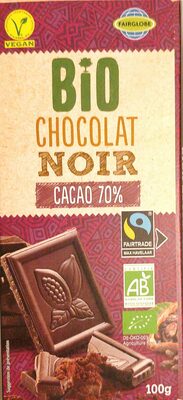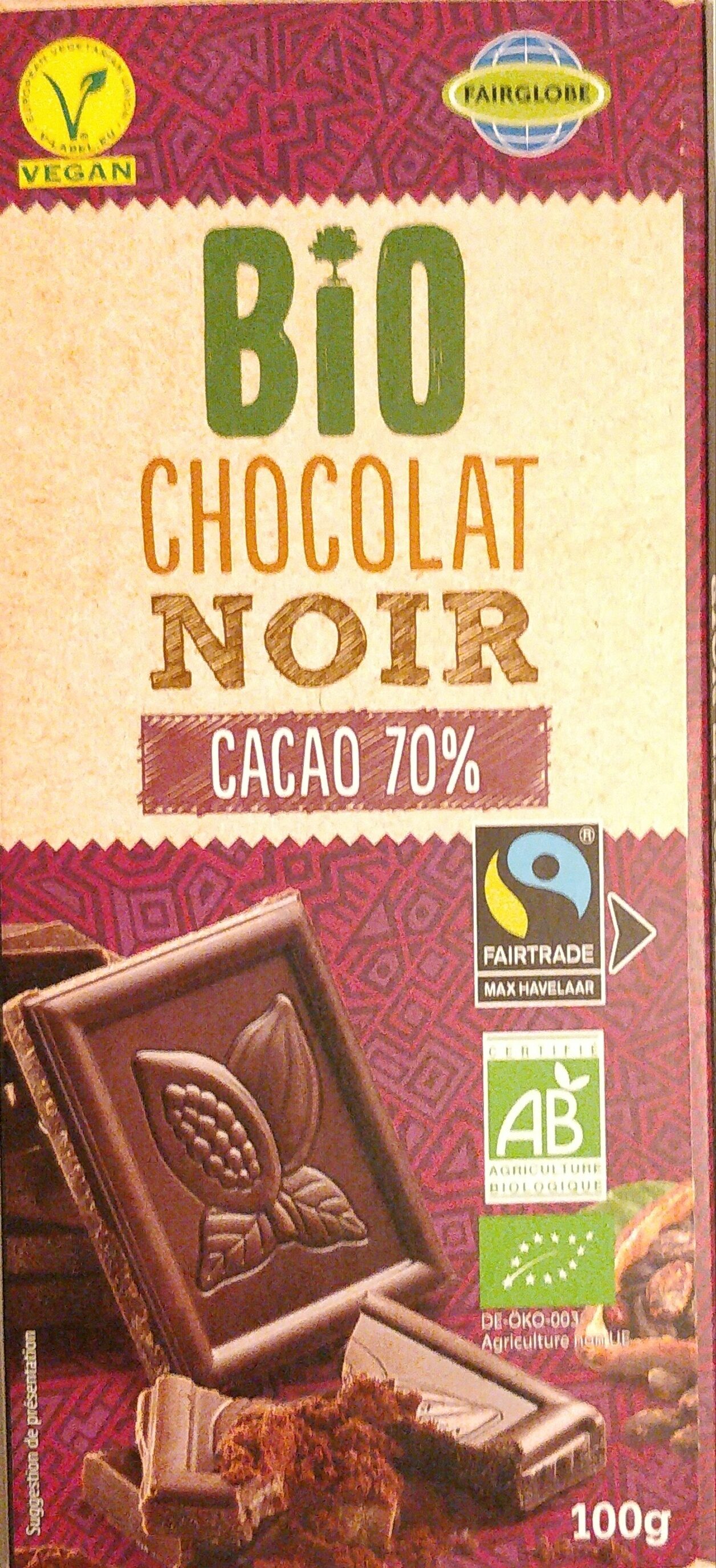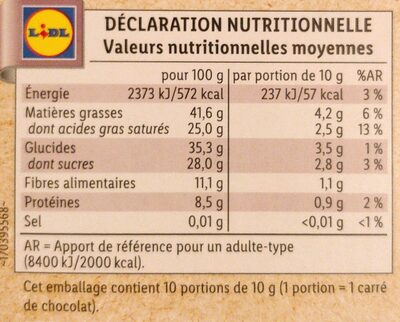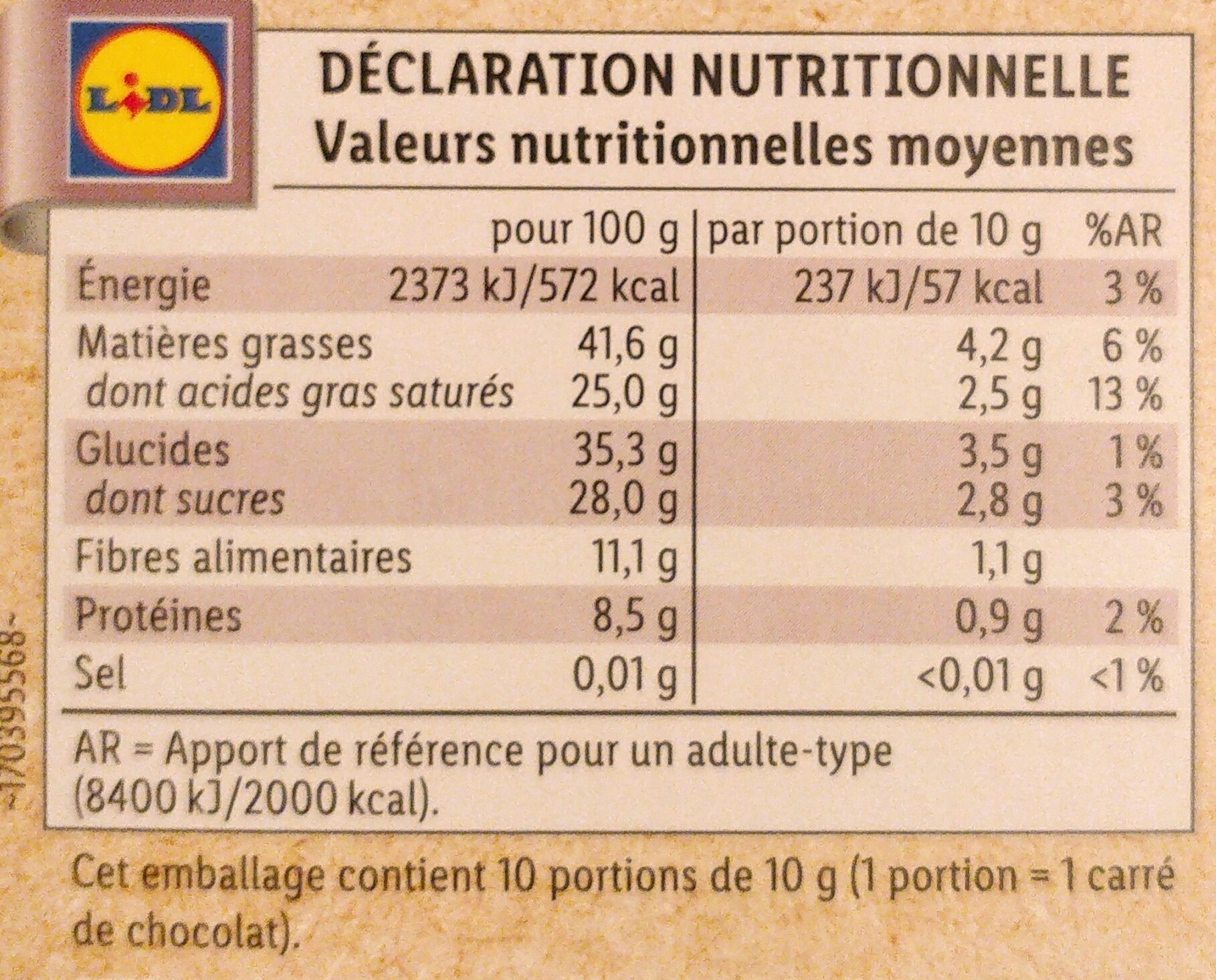Help us make food transparency the norm!
As a non-profit organization, we depend on your donations to continue informing consumers around the world about what they eat.
The food revolution starts with you!
Bio Chocolat Noir Cacao 70% - Fairglobe - 100 g
Bio Chocolat Noir Cacao 70% - Fairglobe - 100 g
This product page is not complete. You can help to complete it by editing it and adding more data from the photos we have, or by taking more photos using the app for Android or iPhone/iPad. Thank you!
×
Barcode: 40896243
Common name: Chocolat noir biologique
Quantity: 100 g
Packaging: Metal, Cardboard, Sheet, Sleeve
Brands: Fairglobe
Categories: Snacks, Sweet snacks, Cocoa and its products, Chocolates, Dark chocolates
Labels, certifications, awards:
Fair trade, Organic, Vegetarian, EU Organic, Fairtrade International, Non-EU Agriculture, Vegan, EG-Öko-Verordnung, DE-ÖKO-003, European Vegetarian Union, European Vegetarian Union Vegan, Max Havelaar, AB Agriculture Biologique, Triman







Stores: Lidl
Countries where sold: Belgium, Bulgaria, France, Germany, Italy, Portugal, Serbia, Spain
Matching with your preferences
Health
Ingredients
-
6 ingredients
French: Pâte de cacao¹, sucre de canne¹, beurre de cacao¹, émulsifiant : lécithines (soja)¹. ¹ingrédient issu de l'agriculture biologique.Allergens: SoybeansTraces: Milk, Nuts
Food processing
-
Ultra processed foods
Elements that indicate the product is in the 4 - Ultra processed food and drink products group:
- Additive: E322 - Lecithins
- Ingredient: Emulsifier
Food products are classified into 4 groups according to their degree of processing:
- Unprocessed or minimally processed foods
- Processed culinary ingredients
- Processed foods
- Ultra processed foods
The determination of the group is based on the category of the product and on the ingredients it contains.
Additives
-
E322 - Lecithins
Lecithins are natural compounds commonly used in the food industry as emulsifiers and stabilizers.
Extracted from sources like soybeans and eggs, lecithins consist of phospholipids that enhance the mixing of oil and water, ensuring smooth textures in various products like chocolates, dressings, and baked goods.
They do not present any known health risks.
Ingredients analysis
-
Palm oil free
No ingredients containing palm oil detected
Unrecognized ingredients: fr:bioSome ingredients could not be recognized.
We need your help!
You can help us recognize more ingredients and better analyze the list of ingredients for this product and others:
- Edit this product page to correct spelling mistakes in the ingredients list, and/or to remove ingredients in other languages and sentences that are not related to the ingredients.
- Add new entries, synonyms or translations to our multilingual lists of ingredients, ingredient processing methods, and labels.
If you would like to help, join the #ingredients channel on our Slack discussion space and/or learn about ingredients analysis on our wiki. Thank you!
-
Vegan
No non-vegan ingredients
Unrecognized ingredients: fr:bioSome ingredients could not be recognized.
We need your help!
You can help us recognize more ingredients and better analyze the list of ingredients for this product and others:
- Edit this product page to correct spelling mistakes in the ingredients list, and/or to remove ingredients in other languages and sentences that are not related to the ingredients.
- Add new entries, synonyms or translations to our multilingual lists of ingredients, ingredient processing methods, and labels.
If you would like to help, join the #ingredients channel on our Slack discussion space and/or learn about ingredients analysis on our wiki. Thank you!
-
Vegetarian
No non-vegetarian ingredients detected
Unrecognized ingredients: fr:bioSome ingredients could not be recognized.
We need your help!
You can help us recognize more ingredients and better analyze the list of ingredients for this product and others:
- Edit this product page to correct spelling mistakes in the ingredients list, and/or to remove ingredients in other languages and sentences that are not related to the ingredients.
- Add new entries, synonyms or translations to our multilingual lists of ingredients, ingredient processing methods, and labels.
If you would like to help, join the #ingredients channel on our Slack discussion space and/or learn about ingredients analysis on our wiki. Thank you!
-
Details of the analysis of the ingredients
We need your help!
Some ingredients could not be recognized.
We need your help!
You can help us recognize more ingredients and better analyze the list of ingredients for this product and others:
- Edit this product page to correct spelling mistakes in the ingredients list, and/or to remove ingredients in other languages and sentences that are not related to the ingredients.
- Add new entries, synonyms or translations to our multilingual lists of ingredients, ingredient processing methods, and labels.
If you would like to help, join the #ingredients channel on our Slack discussion space and/or learn about ingredients analysis on our wiki. Thank you!
fr: Pâte de cacao, sucre de canne, beurre de cacao, émulsifiant (lécithines, Bio)- Pâte de cacao -> en:cocoa-paste - labels: en:organic - vegan: yes - vegetarian: yes - ciqual_proxy_food_code: 16030 - percent_min: 25 - percent_max: 100
- sucre de canne -> en:cane-sugar - labels: en:organic - vegan: yes - vegetarian: yes - ciqual_proxy_food_code: 31016 - percent_min: 0 - percent_max: 28
- beurre de cacao -> en:cocoa-butter - labels: en:organic - vegan: yes - vegetarian: yes - ciqual_food_code: 16030 - percent_min: 0 - percent_max: 28
- émulsifiant -> en:emulsifier - percent_min: 0 - percent_max: 25
- lécithines -> en:e322 - vegan: maybe - vegetarian: maybe - percent_min: 0 - percent_max: 25
- Bio -> fr:bio - labels: en:organic - percent_min: 0 - percent_max: 12.5
Nutrition
-
Poor nutritional quality
⚠ ️Warning: the amount of fruits, vegetables and nuts is not specified on the label, it was estimated from the list of ingredients: 0This product is not considered a beverage for the calculation of the Nutri-Score.
Positive points: 5
- Proteins: 5 / 5 (value: 8.5, rounded value: 8.5)
- Fiber: 5 / 5 (value: 11.1, rounded value: 11.1)
- Fruits, vegetables, nuts, and colza/walnut/olive oils: 0 / 5 (value: 0, rounded value: 0)
Negative points: 23
- Energy: 7 / 10 (value: 2373, rounded value: 2373)
- Sugars: 6 / 10 (value: 28, rounded value: 28)
- Saturated fat: 10 / 10 (value: 25, rounded value: 25)
- Sodium: 0 / 10 (value: 4, rounded value: 4)
The points for proteins are not counted because the negative points are greater or equal to 11.
Nutritional score: (23 - 5)
Nutri-Score:
-
Nutrient levels
-
Fat in high quantity (41.6%)
What you need to know- A high consumption of fat, especially saturated fats, can raise cholesterol, which increases the risk of heart diseases.
Recommendation: Limit the consumption of fat and saturated fat- Choose products with lower fat and saturated fat content.
-
Saturated fat in high quantity (25%)
What you need to know- A high consumption of fat, especially saturated fats, can raise cholesterol, which increases the risk of heart diseases.
Recommendation: Limit the consumption of fat and saturated fat- Choose products with lower fat and saturated fat content.
-
Sugars in high quantity (28%)
What you need to know- A high consumption of sugar can cause weight gain and tooth decay. It also augments the risk of type 2 diabetes and cardio-vascular diseases.
Recommendation: Limit the consumption of sugar and sugary drinks- Sugary drinks (such as sodas, fruit beverages, and fruit juices and nectars) should be limited as much as possible (no more than 1 glass a day).
- Choose products with lower sugar content and reduce the consumption of products with added sugars.
-
Salt in low quantity (0.01%)
What you need to know- A high consumption of salt (or sodium) can cause raised blood pressure, which can increase the risk of heart disease and stroke.
- Many people who have high blood pressure do not know it, as there are often no symptoms.
- Most people consume too much salt (on average 9 to 12 grams per day), around twice the recommended maximum level of intake.
Recommendation: Limit the consumption of salt and salted food- Reduce the quantity of salt used when cooking, and don't salt again at the table.
- Limit the consumption of salty snacks and choose products with lower salt content.
-
-
Nutrition facts
Nutrition facts As sold
for 100 g / 100 mlAs sold
per serving (10 g)Compared to: Dark chocolates Energy 2,373 kj
(572 kcal)237 kj
(57 kcal)+2% Fat 41.6 g 4.16 g +6% Saturated fat 25 g 2.5 g +8% Carbohydrates 35.3 g 3.53 g -9% Sugars 28 g 2.8 g -8% Fiber 11.1 g 1.11 g +18% Proteins 8.5 g 0.85 g +9% Salt 0.01 g 0.001 g -82% Fruits‚ vegetables‚ nuts and rapeseed‚ walnut and olive oils (estimate from ingredients list analysis) 0 % 0 % Cocoa (minimum) 70 % 70 % +3%
Environment
-
Eco-Score C - Moderate environmental impact
⚠ ️Select a country in order to include the full impact of transportation.The Eco-Score is an experimental score that summarizes the environmental impacts of food products.→ The Eco-Score was initially developped for France and it is being extended to other European countries. The Eco-Score formula is subject to change as it is regularly improved to make it more precise and better suited to each country.Life cycle analysis
-
Average impact of products of the same category: D (Score: 35/100)
Category: Dark chocolate bar, less than 70% cocoa
Category: Dark chocolate bar, less than 70% cocoa
- PEF environmental score: 0.88 (the lower the score, the lower the impact)
- including impact on climate change: 16.88 kg CO2 eq/kg of product
Stage Impact Agriculture
88.5 %Processing
5.0 %Packaging
1.2 %Transportation
4.8 %Distribution
0.5 %Consumption
0.0 %
Bonuses and maluses
-
Labels with very high environmental benefits
Bonus: +20
-
AB Agriculture Biologique
Organic agriculture contributes to preserve biodiversity, climate, water quality and soil fertility.
Organic food is food produced by methods complying with the standards of organic farming and features practices that cycle resources, promote ecological balance, and conserve biodiversity.
-
EU Organic
Organic agriculture contributes to preserve biodiversity, climate, water quality and soil fertility.
Organic food is food produced by methods complying with the standards of organic farming and features practices that cycle resources, promote ecological balance, and conserve biodiversity.
-
Fairtrade International
Fair trade is an arrangement designed to help producers in developing countries achieve sustainable and equitable trade relationships. Members of the fair trade movement add the payment of higher prices to exporters, as well as improved social and environmental standards.
-
-
Missing origins of ingredients information
Malus: -5
⚠ ️ The origins of the ingredients of this product are not indicated.
If they are indicated on the packaging, you can modify the product sheet and add them.
If you are the manufacturer of this product, you can send us the information with our free platform for producers.
-
Packaging with a low impact
Malus: -2
Shape Material Recycling Impact 1 Sheet Metal High 1 Sleeve Cardboard Low ⚠ ️ The information about the packaging of this product is not sufficiently precise (exact shapes and materials of all components of the packaging).⚠ ️ For a more precise calculation of the Eco-Score, you can modify the product page and add them.
If you are the manufacturer of this product, you can send us the information with our free platform for producers.
Eco-Score for this product
-
Impact for this product: C (Score: 48/100)
Product: Bio Chocolat Noir Cacao 70% - Fairglobe - 100 g
Life cycle analysis score: 35
Sum of bonuses and maluses: +13
Final score: 48/100
-
Carbon footprint
-
Equal to driving 8.7 km in a petrol car
1688 g CO² per 100g of product
The carbon emission figure comes from ADEME's Agribalyse database, for the category: Dark chocolate bar, less than 70% cocoa (Source: ADEME Agribalyse Database)
Stage Impact Agriculture
94.1 %Processing
2.7 %Packaging
0.6 %Transportation
2.4 %Distribution
0.1 %Consumption
0.0 %
Packaging
-
Packaging with a low impact
-
Packaging parts
1 x Sheet 100 g (Metal: 2.5 g)
1 x Sleeve (Cardboard: 11.2 g)
-
Packaging materials
Material % Packaging weight Packaging weight per 100 g of product Paper or cardboard 81.8% 11.2 g 11.2 g Metal 18.2% 2.5 g 2.5 g Total 100% 13.7 g 13.7 g
-
Transportation
-
Origins of ingredients
Missing origins of ingredients information
⚠ ️ The origins of the ingredients of this product are not indicated.
If they are indicated on the packaging, you can modify the product sheet and add them.
If you are the manufacturer of this product, you can send us the information with our free platform for producers.Add the origins of ingredients for this product Add the origins of ingredients for this product
Labels
-
AB Agriculture Biologique
Organic agriculture contributes to preserve biodiversity, climate, water quality and soil fertility.
Organic food is food produced by methods complying with the standards of organic farming and features practices that cycle resources, promote ecological balance, and conserve biodiversity.
-
EU Organic
Organic agriculture contributes to preserve biodiversity, climate, water quality and soil fertility.
Organic food is food produced by methods complying with the standards of organic farming and features practices that cycle resources, promote ecological balance, and conserve biodiversity.
-
Fairtrade International
Fair trade is an arrangement designed to help producers in developing countries achieve sustainable and equitable trade relationships. Members of the fair trade movement add the payment of higher prices to exporters, as well as improved social and environmental standards.
Report a problem
-
Incomplete or incorrect information?
Category, labels, ingredients, allergens, nutritional information, photos etc.
If the information does not match the information on the packaging, please complete or correct it. Open Food Facts is a collaborative database, and every contribution is useful for all.
Data sources
Product added on by kiliweb
Last edit of product page on by october-food-facts.
Product page also edited by acuario, aleene, chevalstar, date-limite-app, ecoscore-impact-estimator, fayette, foodvisor, grogu, inf, lea-bourrat387, ludovicalchi, mairoluin, mhk-off, moon-rabbit, musarana, openfoodfacts-contributors, osimo, oye, packbot, patnoldi, philanne, prepperapp, professordoc, quechoisir, quentinbrd, raphael, roboto-app, scanbot, segundo, tacite-mass-editor, thaialagata, valmas83, worldtest, yuka.R1BFcE1Mb1Qvc01OeTlvVjBDN1MvdGxMOW9LUkRVSzZjc2d6SUE9PQ, yuka.UllrSFRyWUJ2ZDR5cDhJejRUL3orSWxNNWFmeVEyZWFFdE5CSVE9PQ.















